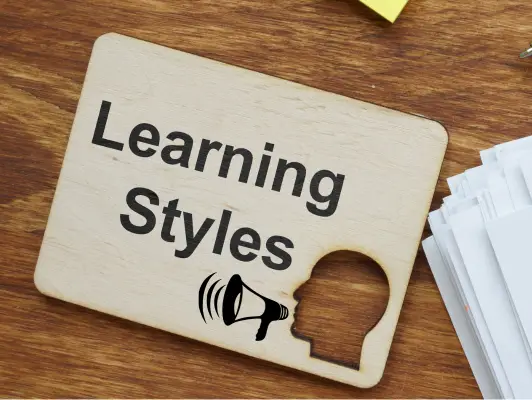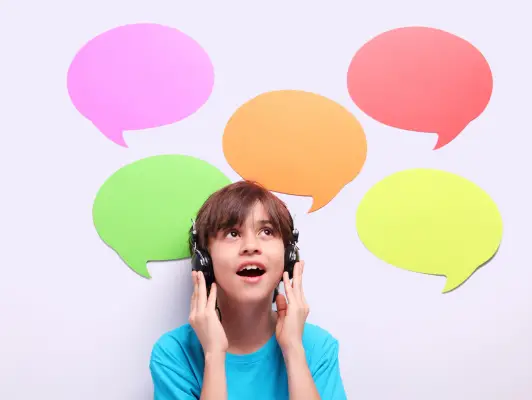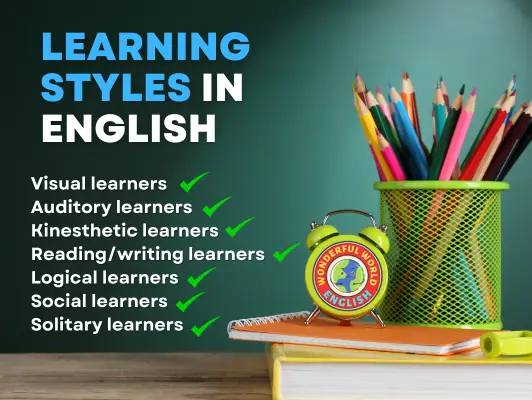Contents
Toggle
Meet David De’ Ath, co-founder, editor, and writer at Wonderful World English. With his extensive background as an English teacher, David provides valuable insights and practical tips on ESL for students and teachers alike.
Learning English can be an exciting adventure that brings opportunities to learners all over the world.
Whether in the realm of business, academia, or personal goals, more people than ever are taking the time to learn English as a second language.
Every individual approaches this journey differently and chooses their own path.
Each of us has our unique ways of understanding and remembering, influenced by our past experiences and personal preferences.
Just like on a trip, some travelers prefer scenic routes while others love direct highways; similarly, in learning, we all have methods that suit us best.
Learning English varies for everyone. Whether you’re a visual, auditory, kinesthetic, reading/writing, logical, social, or solitary learner, understanding your style can simplify the journey. This guide offers tailored advice for each type, aiding English learners on their individual paths.
Recognizing and using this personal learning style can make learning English more straightforward and even more enjoyable.
I am an experienced English as a Second Language (ESL) teacher, and I have applied many different techniques to help my students understand the nuances of English.
We will explore the different learners in English language learning with the aim of bringing a better understanding of this subject.
Let’s venture further into this guide, where we’ll introduce various learning styles and provide specialized advice to help English learners (ELL) make the most of their journey.

Learning Styles in English Language Learning
Learning English is a unique experience for everyone.
The key to mastering the language lies in recognizing your personal learning style and leveraging strategies tailored to it.
Whether you’re a visual enthusiast or an auditory lover, there’s a method that suits you best.
In the sections below, we outline specific techniques for various learning styles.
Let’s discover which ones resonate most with you and kickstart your English learning journey!
But before we do, if you need a place to determine the kind of learner you are, you can do the quiz linked below.
Learning Styles Quiz
Now let’s look at some strategies that can take your English to the next level based on your respective learning style:
1. Visual Learners
Visual learners process and retain information best when they have images, charts, and diagrams to assist them.
In English learning, visually appealing materials can significantly enhance these learners’ comprehension and memory.
Here are some suggestions for visual learners to succeed when learning English:
Flashcards
Use specially designed flashcards that feature English words on one side and relevant images on the other.
This combination stimulates memory and fosters a deeper understanding of vocabulary.
Movies
Immerse yourself in the world of English cinema.
Choose movies that resonate with your interests and enable subtitles in your native language.
This dual exposure to spoken words and visual translation reinforces language acquisition.
Mind Map Creation
Adopt the practice of creating mind maps.
These visual diagrams can act as linguistic frameworks, linking English words with their translations, synonyms, or related imagery.
Mind maps can simplify complex ideas by creating connections between concepts, making the learning journey more structured and intuitive.

2. Auditory Learners
Auditory learners excel when they hear spoken English.
The language’s sounds, intonations, and rhythm help them understand and remember.
For them, listening is a primary tool in language acquisition.
Here are some suggestions for auditory learners to succeed when learning English:
Listen to Music
Integrate English songs into your study routine.
Pay attention to the lyrics, noting unfamiliar words.
The combination of rhythm and language can aid in memory retention.
For a list of the best songs to sing in English, check out the guide below!
Related Article: Best English Songs to Sing – Complete Guide
Use Audio Resources
Take advantage of digital tools like language-learning tapes or apps specifically designed for auditory learners.
These resources often present language in context, making it easier to grasp.
There are lots of great songs and podcasts available.
For a list of the best podcasts available online for English learners, click the link below!
Related Article: Best Podcasts to Learn the English Language
Engage in Conversations
Regularly participate in English conversations.
Whether through formal language exchange sessions or casual chats, speaking and listening in real-time can significantly boost comprehension and fluency.

3. Kinesthetic Learners
Kinesthetic learners thrive by actively engaging their bodies in the learning process.
For them, the act of moving and doing enhances understanding and memory retention, making tactile experiences crucial in language acquisition.
Here are some suggestions for kinesthetic learners to succeed when learning English:
Interactive English Games
Incorporate games that demand physical involvement.
Whether it’s a digital game requiring hand-eye coordination or a board game prompting movement, such activities can make vocabulary and grammar more memorable.
For some inspiration on what games are great to play for language learning, the guide below is for you!
Related Article: Fun Classroom Games to Play – Teacher’s Guide
Role-Play
Take on different roles and act out scenarios in English.
By physically embodying characters and enacting dialogues, learners can contextualize language and improve their speaking skills.
Experiencing English Environments
Visit places where English is primarily spoken, like cafes, theaters, or community centers.
Such immersive experiences allow for real-world language practice, enhancing both listening and speaking abilities.

4. Reading/Writing Learners
Reading/writing learners connect deeply with written content.
English texts become their primary tools for comprehension.
They mostly rely on reading and writing to process, understand, and remember the language.
Here are some suggestions for reading/writing learners to succeed when learning English:
Journal
Keep a regular journal in English.
Document your daily experiences, pen down stories, or jot down reflections.
This continuous engagement with writing sharpens linguistic skills and enhances vocabulary.
Explore English Literature
Learners can start their reading journey with more straightforward texts like children’s books.
These offer foundational language insights and progress to more complex works as your understanding deepens.
They can begin increasing the difficulty once they are confident with more basic texts.
Grammar Practice
Strengthen your foundation by focusing on grammar.
Regularly rewrite English sentences to practice structuring and to familiarize yourself with the language’s nuances.
This practice refines both reading comprehension and writing proficiency.
For a list of the best apps to learn English grammar, click the link below!
Related Article: Which is the Best App for Learning English Grammar? – Top 10

5. Logical/Mathematical Learners
Logical/mathematical learners approach English with analytical prowess.
They excel by identifying patterns, understanding structures, and applying systematic reasoning to the language.
Here are some suggestions for logical learners to succeed when learning English:
Grammar Exploration
Dive into the core structures of English by studying grammar rules methodically.
Understand the logic behind sentence constructions, verb tenses, and other linguistic aspects.
Puzzles
Elevate your language skills by tackling English puzzles or crosswords.
These challenges not only enhance vocabulary but also sharpen analytical thinking.
Vocabulary Organization
Group English words into relevant categories, such as food, travel, or business.
This structured approach aids in quicker recall and a deeper understanding of contextual usage.

6. Social/Interpersonal Learners
Social/interpersonal learners flourish best in communal settings.
For them, interactions, discussions, and collaborative experiences are the keys to unlocking English proficiency.
Here are some suggestions for social learners to succeed when learning English:
Group Discussions
Engage in group conversations about diverse topics in English.
Such interactions enhance listening and speaking skills while exposing learners to different viewpoints and vocabulary.
Language Exchange
Pair up with a language buddy or participate in exchange sessions.
This one-on-one interaction provides real-time feedback and offers a safe space to practice and rectify errors.
English Activity Clubs
Join or form clubs that conduct activities, games, or discussions in English.
These communal experiences foster language skills and build confidence and camaraderie among learners.

7. Solitary/Intrapersonal Learners
Solitary learners often thrive in individualized settings, drawing strength from introspection and self-paced study.
Their approach to English is methodical and reflective, valuing depth over breadth.
Here are some suggestions for solitary learners to succeed when learning English:
Goal-Oriented Study
At the start of each week, outline specific English learning objectives.
These serve as a clear pathway, helping maintain focus and ensuring you remain on track.
Progress Diary
Document your journey with an English learning diary.
It’s a tool to track progress and a space to reflect on experiences, challenges, and breakthroughs.
Consistent Practice
Dedicate a specific time daily for undisturbed English practice.
This commitment helps build a routine, ensuring regular engagement and deep immersion into the language.

Conclusion
Mastering English becomes easier when you understand your unique way of learning.
Think of it like traveling: everyone has their favorite roads or shortcuts that make the trip smoother.
In the same way, learners have methods that help them grasp information best.
By tapping into these personalized strategies, you can tackle the challenges of the English language with greater ease.
This tailored approach makes the entire learning experience effective and enjoyable, turning each lesson into a rewarding step on your journey.
We hope you have found value in this guide.
Have a wonderful day!
Image Attribution: All images licensed via canva.com





